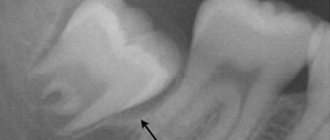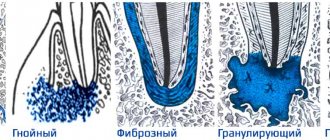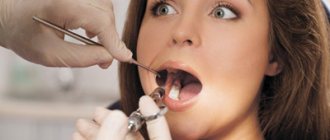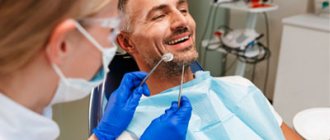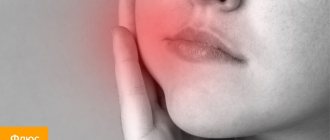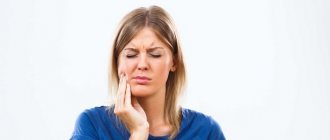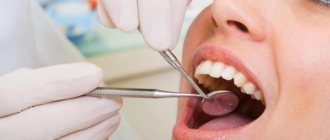26.11.2019
If you're wondering whether teething can cause your baby to sleep poorly, our answer is, of course, yes. From this article you will learn how to recognize the first signs of teething, what remedies will help facilitate the eruption of the very first tooth in a baby and prevent sleep disturbances during teething.
Unfortunately, many people underestimate teething as a cause of child sleep disturbance. Everyone knows that during painful teething, a child’s sleep is often disrupted, because the baby is uncomfortable. But have you ever thought that teething could be the main reason for sleepless nights? Or that it is precisely because of teething that the baby cannot calm down and fall asleep on his own?
For some babies (and their parents!), the eruption of baby teeth occurs almost imperceptibly. Salivation increases slightly - and suddenly a tooth appears! But for many children, the eruption of baby teeth is accompanied by pain. In addition, constant pressure inside the gums bothers and irritates the baby. Due to discomfort, the child may lose appetite.
So, directly or indirectly, teething affects the baby's night sleep. During the day, it is easier for a baby to be distracted and calm down in the arms of his parents, but at night the discomfort is felt much more strongly. And the discomfort and pain that accompany teething usually means that no one in the family will sleep at night.
Why do my teeth hurt at night but not during the day?
It would be more correct to say that your teeth hurt more at night. During the day there are too many distractions that prevent you from focusing on your feelings. Work, household chores and even simple walking force the brain to work in a different direction, which leads to less pain.
Another, main factor is physiological. In the evening, the level of corticosteroids in the body begins to decrease; they are “responsible” for reducing pain. Hormone production reaches a minimum between midnight and five in the morning, after which the tooth gradually begins to fall out. Usually by this time the exhausted body “gives up”, the person falls asleep and gets a short respite.
Another cause of night pain is the horizontal position of the body during sleep. The rush of blood to the head increases, while the nerve roots are compressed and the pain intensifies. This is especially noticeable with pulpitis, when the sensations become unbearable.
Important.
If you notice increased pain while lying down, raise the pillow higher and practically sit down. The blood will drain from your head and it will become a little easier.
It’s a special problem when the tooth under the filling hurts. This means that an infection has entered the treated cavity and an inflammatory process has begun. The resulting pus, even in a minimal amount, has no way out and begins to compress the nerve roots, which leads to severe acute pain that can even radiate to the ear and throat.
At night, it is also possible to experience minor pain after the removal of a tooth or nerve, as well as after treatment of deep caries. This is normal and does not require any serious measures to be taken. In this case, it is enough to take a tablet of any analgesic or rinse your mouth with a warm soda solution.
Important.
If you had a difficult removal and then experienced severe pain at night, you should immediately consult a doctor in the morning. Alternatively, bone fragments could remain in the socket. In this case, the entire jaw will hurt, and it will be almost impossible to relieve the sensation even with strong medications.
Sleep and teething - what to do?
All parents know that teething is one of the most unpleasant events that can happen to their baby. Children become capricious, sleep poorly and put everything in their mouth. But parents often confuse poor sleep and the vagaries associated with it with teething. How to understand that your baby is teething and how to maintain good sleep?
Some sleep experts write in their books that teething does not harm sleep if the baby has already formed the right habits. But I can't agree with this. As with everything else, all children are different, and their pain sensitivity threshold is different. So I think it's our responsibility as parents to sympathize and try to help kids get through this difficult period, but at the same time make sure they get enough sleep.
What are the signs that your baby is teething?
- excessive salivation;
- runny nose;
- redness of the cheeks and/or rash on the chin, around the mouth;
- refusal of the breast/bottle or, conversely, the desire to breastfeed more often;
- strengthening of the sucking reflex;
- desire to bite/gnaw everything around;
- swollen, whitish gums;
- difficulty falling asleep and staying asleep;
- capriciousness, tearfulness.
Also, sometimes when teething, the temperature may rise, stool and frequency of urination may change. But if these symptoms occur, you need to be more careful, as they may indicate an infection. Therefore, if you have any suspicions, it is better to consult a doctor.
How to distinguish teething from just bad sleep?
In fact, this is a very difficult question. My baby, for example, never had swollen gums, fever or runny nose, and the desire to put everything in his mouth did not depend on teething. I usually discovered new teeth by accident. That is, just yesterday evening the gum looked as usual, but today a tooth is sticking out of it. How can you differentiate poor sleep due to teething from other causes of poor sleep? Here are the main points that parents need to remember:
1) The baby slept well, but now he sleeps very poorly. If you have ruled out all possible reasons for waking up and the baby is not sick, then it may be that his teeth have begun to bother him. If this is the case, look closely and you may be able to spot one or more of the symptoms listed above.
2) The baby feels unwell throughout the day. The discomfort from teething should not be confused with the evening whims that arise due to insufficient sleep during the day or going to bed late at night. Indeed, the baby may be more restless at night. But if he behaves very well during the day, and often wakes up at night, then the cause may not only be his teeth.
3) If you have ruled out all other causes of your baby’s anxiety, then you can give him a painkiller 15-20 minutes before bedtime (for example, Nurofen - 2.5 ml once), having previously discussed this with your pediatrician. If the baby is really worried about his teeth, then he will fall asleep better and will not wake up for at least 4 hours, or even all 5-6 (if at night), and during the day he will have a full sleep lasting 1.5-2 hours.
How long does teething take?
It can take 2 years from the first to the last tooth. But this does not mean that the baby will sleep poorly for the entire 2 years “because of teeth.” Very often, parents attribute poor sleep to teething. But in reality, teething itself lasts 2-5 days (molar teeth take longer to erupt). The rest of the poor sleep time is the result of bad habits that we, parents, unknowingly create.
How to help your baby?
Even though it is very difficult to relieve a baby's distress, we still need to make every effort to help him fall asleep and get enough sleep throughout the day and night.
Throughout the day, various teethers (pre-chilled in the refrigerator), a pacifier, special massage brushes, additional drinking of cool water, and additional breastfeeding can help. Teethers helped my baby, but I know many mothers who said that it didn’t help them at all. Try to experiment, and perhaps you will find something that suits your baby.
Nonsteroidal anti-inflammatory drugs (ibuprofen or paracetamol) are considered the most effective medications. Children's ibuprofen (=nurofen) is considered the gold standard, but some experts do not recommend it before 6 months. Therefore, before giving your baby one of these drugs, consult your pediatrician .
Freezing gels can also help. But they must be used very carefully, as they can have a fairly strong “freezing” effect, which can greatly frighten the child and he may become even more restless. Note! According to the latest data, it is not recommended to use pain-relieving gels that contain benzocaine (for example, Orajel), as they can be dangerous to your baby's health. (More about this here.)
Separately, I would like to say about homeopathic medicines. As is known, their effectiveness has not been proven. But the harm has also not been proven. Although mothers claim that their baby “helped a lot.”
Should I stop sleep training during teething?
There can be no clear answer here. If the baby is very unwell, his temperature has risen and he refuses to eat, you should pay him even more attention, take him in your arms, hug him, stay with him longer, even if this affects his sleep. But if the baby is simply “gnawing on his fists,” then you should not deviate from the planned plan. As I already wrote above, teeth erupt over the course of 2 years, but this does not mean that you need to suffer all these 2 years and wait for them to all erupt.
Natalya Domres, children's sleep consultant, neurologist and author of the Baby's Sleep project
Dear Parents! I sincerely wish your babies healthy teeth and good sleep. If you need help, you can always contact me for a consultation, and together we will help you and your baby get enough sleep!
Do you want to keep abreast of new articles and events of the Baby's Dream project? Sign up for the newsletter on the right side of the page!
Dead tooth hurts
After the nerve is removed, the tooth may respond for some time with mild pain to pressure or biting, including at night. This is a normal reaction. In these cases, it is enough to take a painkiller tablet.
If the pain becomes twitching and intensifies, it means that the nerve was not completely removed or the doctor made mistakes related to cleaning the canals or installing a filling. The biggest problem is that neither pills nor folk remedies will help. Start looking for a doctor right away.
REASONS CAUSING BRUXISM IN CHILDREN
Bruxism often affects very young children. This symptom appears in infants whose first teeth have erupted in their mouths. Grinding of teeth during sleep prevents a child from getting a full night's sleep. During the day, the baby behaves capriciously and becomes whiny. Bruxism can also occur during daytime naps.
The teeth of such a baby may become loose, which leads to discomfort in the process of chewing food. Overexertion causes pain in the baby's neck and head. Sometimes bruxism causes the formation of malocclusion. Most often, the problem subsides after 5 years, and after another year or two it disappears completely. But why wait so long? It is easier to identify the cause and eliminate it at an earlier age.
NERVOUS EXCITATION
Today, a large percentage of children are born with increased nervous excitability; they are also called hyperactive. The cause of this state of the nervous system can be:
- complications during pregnancy;
- birth injury;
- asphyxia at the time of birth.
The baby flinches when he hears sharp sounds. His arms and legs may shake, and his chin trembles when crying. Such children do not gain weight well, often spit up, and behave restlessly. Hyperactive children need to establish a routine for sleeping, feeding and walking. Gymnastics and massage will be very useful. Classes must be held daily.
Baths with herbal decoctions (lemon balm, string, mint, hawthorn, chamomile) give a good effect. If you follow all of the above measures, by the age of 1 year your baby’s nervous system will become stronger. If no positive dynamics are observed, you can give your one-year-old baby sedatives prescribed by a doctor. The medicine in the form of a suspension or tablets is added to breast milk.
EMOTIONAL LOAD
In the early period, weaning can become a powerful stress for the child. Older children may overreact to emotional stress. For example, stress experienced at 3 years of age can cause the unexpected appearance of bruxism. Any unexpected or unpleasant event can act as a stress factor:
- sudden change of situation;
- the arrival of a new family member;
- departure of one of the parents;
- scandal or scenes of violence seen by the child;
- the initial stage of getting used to kindergarten.
Children do not yet have a mental defense mechanism. Children adapt to emotional stress much worse than adults. If a child begins to grind his teeth when he sleeps, after suffering stress, it is better to show him to a neurologist, who will prescribe the appropriate treatment.
TEETHING
The teething process is different for all children. Sometimes this proceeds smoothly and has almost no effect on the baby. In some cases, teeth cut together, which is accompanied by severe pain and swelling of the gums. Typically, parents encounter this phenomenon when the child turns 9 months old and already has several teeth in his mouth.
The baby unconsciously fights the discomfort by clenching his jaw tightly. Mom often observes manifestations of bruxism during daytime sleep, when the child is in front of her. In this case, special cooling gels and dental wipes for children with antibacterial impregnation will help alleviate the condition. Pediatric dentists also recommend using a special device that makes teething easier.
NASAL CONGESTION
Grinding of teeth during sleep may occur in a child due to a cold. During a runny nose, the baby cannot breathe normally, which irritates him. The baby clenches his jaws forcefully and moves them, provoking an attack of bruxism. In this case, after treatment of the runny nose, the grinding of teeth will also go away.
The Otrivin Baby aspirator or similar products will help relieve nasal congestion and diarrhea. Special sprays intended for the treatment of rhinitis in newborns are suitable as a treatment.
MALOCCLUSION
A child may grind their teeth in their sleep due to an incorrect bite. In this case, disturbances in the structure of the maxillofacial apparatus play a role. The sooner the deviation is detected, the greater the chances of correcting the bite.
Parents will have to visit the dentist with their child. Braces are installed for children starting at the age of eight. Thanks to braces, the teeth will take the correct position after a certain time.
DEFICIENCY OF MICROELEMENTS AND VITAMINS
A lot of vitamins and microelements are spent on the formation of the body in childhood. Their deficiency manifests itself in children in the form of various pathologies, including bruxism. Doctors associate this phenomenon with a lack of B vitamins, calcium and magnesium in the child’s body. If there are no other prerequisites for teeth grinding, you should give your baby vitamins for children, perhaps after this the problem will disappear by itself.
ADENOIDS
Problems with adenoids are not uncommon in childhood. Lymphoid tissue grows in the child's nasopharynx. The preconditions for this are provided by an immature immune system. When the immune system strengthens, the adenoids become smaller. It has been established that 80% of children with a similar problem suffer from bruxism.
This is due to the fact that the adenoids prevent the child from breathing normally. The overgrown tissue can become inflamed. In this case, doctors diagnose adenoiditis. In this case, surgery (adenotomy), during which excess lymphoid tissue is excised, will help get rid of bruxism.
HEREDITY
Oddly enough, heredity can also play a role in the occurrence of bruxism. Grinding of teeth during sleep is often observed in children whose parents faced the same problem in childhood. If the child is generally healthy, all that remains is to wait until school age. By this time, hereditary bruxism should disappear.
BAD HABITS
In infancy, teeth grinding is often associated with thumb sucking. The child must be weaned from this habit. The reason that infants put their finger in their mouth may lie in their hyperexcitability or simply temporary anxiety. But the consequences will definitely not please the baby’s mother.
In addition to bruxism, thumb sucking leads to improper development of the jaw and disrupts the normal growth of teeth, of course, when this happens systematically for a long time.
More frequent breastfeeding will help eradicate the bad habit. Artificial babies can be given a pacifier. To prevent the baby from sucking his thumb, the mother should try to distract him or occupy his hands with something (a rattle, other toys that develop motor skills).
Wisdom tooth hurts
A special unit in our body is the wisdom tooth. It usually erupts at the age of 18-25 years, and severe pain may occur. The molar breaks through the bone and gum tissue, essentially tearing it apart. At night, the pain may intensify; it can be relieved with the help of pain-relieving gels (Cholisal, Metrogyl Denta, Asepta) or analgesics.
It’s good if the tooth runs vertically and has enough space in the gum. A much worse option is when the molar breaks through at an angle or even horizontally. The “figure eight” puts pressure on the roots of neighboring teeth and displaces them. In addition to pain, swelling of the gums and cheeks may appear, as well as an increase in body temperature. As a temporary option, you can take painkillers, but the problem will have to be resolved with a surgeon. As always, the sooner the better.
A wisdom tooth can simply hurt due to caries, pulpitis, periodontitis, or cysts. Another reason is inflammation of the so-called hood, a fold on the gum that forms when teeth erupt. The cause of pericoronitis is the accumulation of food particles, which gradually begin to rot, accompanied by pain in the “eight” area. In the most severe situations, pus begins to secrete.
To relieve pain, you can rinse your mouth with warm infusions of herbs (sage, chamomile), use a gel and take a pain reliever. And in the morning - to the doctor.
Important.
A wisdom tooth is also a tooth. But, if it interferes with the normal position of the teeth, causes crowding, or if the dentin is deeply damaged, dentists recommend removing it.
DIAGNOSIS AND TREATMENT OF BRUXISM
If parents notice that the baby grinds his teeth in his sleep, but there are no obvious reasons for bruxism, the child should be shown to specialists. The best place to start is to go to the pediatrician. The doctor will collect anamnesis and conduct a general examination. Additional consultation may be required from:
- dentist;
- orthodontist;
- neurologist.
Modern pediatricians tend to put bruxism on a par with conditions such as sleepwalking (sleepwalking) and nocturnal enuresis. If creaking occurs frequently during sleep, bruxism requires treatment. At such moments, some processes in the child’s body are disrupted - breathing and heartbeat quicken, blood pressure rises, and other important indicators may go wrong. If the pathology is not treated, negative health consequences are possible.
It is also necessary to determine whether grinding teeth during sleep is one of the signs of epilepsy. For this purpose, a polysomnographic study is prescribed, during which the movements of the muscles of the sleeping baby are recorded. Convulsions during epilepsy can also lead to spasms of the facial muscles, which may be accompanied by teeth grinding.
Special sensors are attached to the child’s body to monitor the functioning of the brain, heart, and movements of the temporomandibular joint. The study is accompanied by video recording.
If bruxism is caused by a neurological pathology, the doctor prescribes anticonvulsants, brain metabolites, and nootropics. When prescribing the drug, electroencephalogram data must be taken into account.
PHYSIOTHERAPEUTIC TREATMENT
Physiotherapeutic procedures improve the child’s psycho-emotional functioning and have a positive effect on the condition of the chewing muscles and neck muscles. For this purpose, ultrasound devices and magnetic therapy are used. Modern methods include neuroelectric stimulation of facial muscles.
WEARING A MOUTH WEARING
Baby teeth are not very hard, so with frequent pressure and grinding they begin to break down. When the first signs of enamel wear appear, you must order a protective mouth guard from your dentist, made taking into account the individual characteristics of the baby. The device is made of biocompatible plastic. With the help of a mouth guard you can:
- prevent tooth wear;
- relieve tension in the chewing muscles;
- ensure normal functioning of the jaw joint.
The design must be very precisely selected. Only in this case will it provide the desired effect.
RELAXING THE FACIAL MUSCLES
A set of relaxing exercises for the face is called myogymnastics. The method is used as an auxiliary method in addition to the main method of treating bruxism. An integrated approach always gives the best results. Of course, this technique is not suitable for a one-year-old baby, but with children 4-5 years old it is quite possible to conduct classes every day before bed.
The first successes become noticeable after 1-2 weeks. There are several types of myogymnastics for the face. Similar complexes have been developed by domestic and foreign specialists. Videos of exercises are easy to find on the Internet. Very young children can have their lower face massaged using stroking movements.
LOADING THE MASTING MUSCLES
To avoid hypertonicity of the child’s masticatory muscles at night, it is necessary to load them as much as possible during the day. The baby should be offered healthy solid food in the form of an apple, carrot, or dried bread. During the chewing process, the muscles will receive a discharge. During the active phase of teething, the baby is given special rubber toys to chew on - teethers.
Reasons not related to teeth
With severe toothache, it seems that everything hurts - the ear, throat, head and even the skin on the face. In some cases, a person is not able to determine the source of the sensation and believes that a bad tooth is to blame.
Night pain similar to toothache can also occur in the following cases:
- For inflammation of the trigeminal nerve. Characterized by a nagging, severe pain, localized in the area of one tooth or spread throughout the entire jaw. This is explained by the fact that the branches of the nerve are located very close to the roots of the teeth and when they become inflamed, pain occurs that is very similar to toothache.
- For sinusitis, sinusitis, otitis media. Swollen tissues and sinuses filled with purulent contents put pressure on the roots of the teeth. The resulting pain is very similar to toothache. In most cases, it is observed in children who find it difficult to correctly determine the location of pain
- Under stress. Chronic night pain can be considered as one of the factors confirming the stressful state of the body.
Important.
Even if you have such assumptions, you will still have to visit the dentist. This must be done in order to exclude inflammatory diseases of the teeth and oral cavity, correctly diagnose and prescribe the correct treatment.
Features of children's sleep
The structure of children's sleep differs from that of adults. For example, in the first months of life, REM sleep accounts for more than half of its total duration. A baby's sleep begins with the "rapid" sleep phase, while in an adult it begins with the "slow" sleep phase. The distribution of time will also vary: for example, in newborns, the total sleep time is distributed equally between day and night; by one year of life, night sleep becomes predominant; by the age of 4, most children no longer feel the need for daytime sleep. [2]
According to official statistics, on average, each newborn spends about 18 hours a day sleeping. If a newborn baby does not sleep well, this can have a detrimental effect on his health and behavior. In the first half of the year, for good health, the baby needs at least 14 hours of sleep per day, however, the normal duration can vary from 11.4 to 16.5 hours. Gradually, the need for sleep in infants decreases, which is associated with the development of the nervous system, and a child aged 4 years needs about 12 hours of rest per day.
Ensuring quality and regular sleep is very important for the life and further development of the baby. The release of the so-called growth hormone - melatonin - occurs in children mainly in the stage of deep sleep; processing information and entering it into memory occurs in a dream - which is important in the first months of a person’s life. [3]
What to do if you have tooth pain at night
It is necessary to assume that at night the pain becomes much stronger than during the day. Physiologically, a person should already be resting, but he has to look for a way to alleviate his condition. The worst case scenario is when acute pain causes you to wake up.
In such situations, all thoughts are aimed at eliminating unpleasant sensations as soon as possible. It is unlikely that someone will prepare a complex decoction or tincture in the middle of the night.
We offer several quick solutions to help relieve the pain at least a little:
- Immediately take an analgesic - any one you have in the house. The group includes analgin, tempalgin, pentalgin, ketorol. Paracetamol will help. Be aware of the danger of overdose. Medicines begin to act approximately 20-30 minutes after administration.
- Apply something cold to your cheek. Take ice or a piece of meat out of the freezer; even a pack of dumplings will do. Wrap it in a towel and apply it to the sore cheek. The cold will help relieve swelling from the tissues, and the pressure on the nerve roots will decrease. It is important to remember that you need to take breaks every 15-20 minutes so as not to chill the trigeminal nerve.
- Rinse your mouth with a warm solution of baking soda - one teaspoon per glass of water. Repeat rinsing every half hour. It will not be possible to completely remove the pain, but it will become a little easier.
- Brew any herb that has anti-inflammatory properties - chamomile, thyme, oregano. Standard proportions are one tablespoon per glass of boiling water. Infuse, cool, strain. Rinse only with warm solution.
- Use folk remedies - apply a piece of lard to the sore gum, a clove of garlic to the wrist. If you have it in the house, you can rinse your mouth with vodka or cognac (do not drink, this is important) - at first you will feel a sharp pain, then it will become easier.
If you are tired and can no longer walk, lie down in a semi-sitting position. In this case, the head must be higher than the body.
To distract yourself, you can do some quiet work - ironing clothes, drawing, embroidering, writing notes. The main thing is that you can switch your attention.
You will need to survive the most difficult time - from midnight to five o'clock in the morning. In the morning, the production of corticosteroids will begin to increase, and the pain will subside a little. We recommend that you prepare for a visit to the doctor once. No one else will help you.
Do not ignore preventive visits to the dentist.
It is enough to visit a specialist 1 – 2 times a year, which will allow you to promptly identify any dental problem at an early stage of development. This means that its elimination will be quick, easy and without complications.
By clicking the “request a call” button you agree to the personal data processing policy.
What not to do if your tooth hurts
We consider it our duty to remind you of what you absolutely cannot do, even if the pain is very severe. Some of these recommendations may cause laughter, but such cases have been encountered in practice.
So, let's list:
- We don’t heat – we don’t use a heating pad, an iron, hot metal, we don’t lean our cheeks against a hot radiator. Heat provokes swelling, tissue pressure on the roots of teeth and nerves increases, and the pain becomes unbearable. Heating is also dangerous because pus can break through into the sinuses and skull tissue.
- We don’t take antibiotics - firstly, they won’t help, and secondly, such medications should not be taken without a doctor’s prescription.
- We don’t take no-shpu - it won’t help, the principle of action of the medicine is based on its effect on the transverse muscles. No-spa does not help with toothache.
- We don’t try to pull out a tooth or pick out a filling ourselves. There is a high probability of damage to the tooth, jaw and infection.
- We absolutely do not drink alcohol. If you smoke, try not to exceed your limit - excess nicotine will worsen the condition.
Important.
You cannot apply a piece of analgin tablet or any other painkiller to your gum or cheek; you will get a severe burn and tissue necrosis. And don’t delay the visit to the dentist, you still have to go.
When you can't put off visiting a doctor
Night pain is dangerous because a person does not have the opportunity to immediately go to a doctor and fix the problem. In particular, in the pre-dawn time, against the background of pain and anxiety, blood pressure may rise and a stroke may occur.
If you have severe night pain:
- body temperature increased;
- breathing became difficult;
- heart rate increased;
- severe swelling appeared on one side of the face;
- facial sensitivity on the affected side is impaired,
We call an ambulance and don’t wait for the condition to worsen.
In cases where the pain simply becomes unbearable and it becomes impossible to endure it, look for clinics or services that provide dental care around the clock.
Important.
Be careful when taking medications. Under no circumstances should an overdose be allowed, as this can lead to an allergic reaction, including swelling.
Psycho-emotional discomfort
The first factor from this group is significant changes in the child’s life: moving, joining the family, starting “kindergarten” life. The child is worried, worried and sleeps poorly.
How to proceed:
- don't scold;
- devote enough time during the day;
- discuss the baby’s feelings and emotions;
- gently soothe;
- pay attention to the positive aspects of change.
The second factor is stress: a quarrel with a friend, a fight with a peer, scandals in the family, divorce of parents. The baby replays the situation in his head over and over again, blames himself for everything, and sleeps little and restlessly.
How to proceed:
- talk to your child more often, tell him that you love him;
- consider the problem from different angles;
- explain the actions of other people;
- Do not allow the baby to be present when adults quarrel.
The third factor is fears. They are varied, occur in children at the age of 2-3 and can disturb a child’s sleep for a long time, preventing him from falling asleep, and then exhausting him with nightmares.
How to proceed:
- if fears arise in a 2-year-old child due to the cancellation of co-sleeping with his mother, extend this period a little;
- create calming bedtime rituals - a warm, relaxing bath, a good bedtime story from dad or a lullaby from mom;
- get an object intermediary - a teddy bear or a bunny that you can hug in your sleep and no longer be afraid of;
- do not insist on complete darkness - turn on a small night light.
The fourth factor is congenital increased excitability. Such children are anxious, restless, and have difficulty parting with their mother.
How to proceed:
- if possible, organize co-sleeping in the first year or two of life;
- do not scold or shame;
- before going to bed, prefer very quiet activities and have a relaxing massage;
- when waking up at night, make him feel that the baby is safe - pat him on the arm or back, calm him down in a quiet voice.
Prevention of dental diseases
Preventive methods for dental diseases are very simple. It is necessary to maintain daily oral hygiene, visit the dentist 1-2 times a year, and monitor your diet.
If you are a smoker with or without experience, or a big fan of strong tea or coffee, be prepared for the fact that preventative cleaning will need to be carried out more often. Dental plaque is an ideal environment for the proliferation of pathogenic flora and, accordingly, the occurrence of inflammatory lesions on the teeth and in the mouth.
Food must contain sufficient amounts of phosphorus and calcium, vitamins, and microelements. Improper nutrition will lead to rapid destruction of dentin and tooth loss.
Particular attention to these factors should be paid to those who are prone to periodontal disease and periodontitis or are already sick with them.
Author: Elena Kopylova Dentist-therapist, endodontist, pediatric dentist. Work experience more than 7 years. The information is for reference only. Before treatment, consultation with a doctor is necessary.


